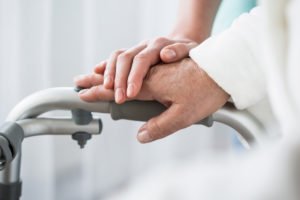
Many families place their senior loved ones in nursing homes because they cannot take care of themselves and need the help of the nursing home staff for their basic physical needs.
These care providers sometimes take advantage of a situation and seek to control their residents through a combination of fear and abuse. The elderly residents in a nursing home environment are often vulnerable targets for their abuse. If you have suspicions that the nursing home staff may be abusing your loved one, do not hesitate to contact legal help to support you in uncovering evidence.
Encountering abuse in a nursing home is a terrifying situation for a family member, spouse, or child of the elderly resident. When your loved one is in danger of physical, mental, or sexual abuse by the persons in charge of their care, it is time to seek legal help.
A Dallas nursing home abuse lawyer might be able to assist you with your case and tell you whether they can be held in breach of their professional duties for your loved one. Contact Ben Crump Law, PLLC today at 800-959-1444.
Nursing Home Abuse
Unfortunately, some nursing homes exist on minimal budgets, and financial concerns often supersede excellent care. Lower budgets can lead to poor or improper training protocols that can later lead to serious accidents or personal injuries for the resident.
Elder abuse happens on a variety of levels. At its core, nursing home abuse is all about direct and indirect mistreatment committed by the nursing home staff or management that puts your loved one in the way of pain, distress, or physical injury. Here are some generally considered forms of elder abuse, according to the National Center on Elder Abuse:
Physical Abuse: The intentional use of physical force that can cause injury, pain, impairment, distress, or possibly death. Forms of physical abuse in a nursing home can include hitting or punching, grabbing or twisting, or using bodily force to sideline an elderly person.
Psychological Abuse: This is a type of spoken or unspoken behavior that can cause mental trauma, distress, or anguish in an elderly person. It is a type of intimidation to exert control while establishing fear in the resident.
Sexual Abuse: This abuse involves the use of forced or unwanted sexual advances, touching, and sexual acts perpetrated on a senior without consent or approval.
Financial Abuse: This type of abuse is when a nursing home staff member uses illegal or unauthorized ways to steal or siphon money from a senior’s accounts for personal gain.
Neglect: Neglect can take place by not caring for a senior in the manner expected, failure to meet essential living needs in the nursing home, and other lapses in care that can lead to compromised health and safety.
If you have visited your loved one in a nursing home and feel that the nursing home staff is guilty of one or more of these activities, you have the option to consult with a Dallas nursing home abuse lawyer at Ben Crump Law, PLLC. Bring your suspicions to our legal representative to discuss, and we will investigate these allegations to see if a lawsuit for negligence can be filed against the nursing home facility.
For a free legal consultation with a nursing home abuse lawyer serving Dallas, call 800-712-9119
Nursing Home Abuse Signs
The lack of quality services in Dallas nursing homes can lead to a number of other issues, including low staff morale, understaffing, poor management, and other challenges.
According to the National Institute on Aging, here are some signs that can tip a family member off to potential abuse in the nursing home. Some signs may be obvious, but others may be missed if you are not specifically looking for these signs:
- Physical bruising: Unexplainable bruises on a resident’s arms and legs can be signs of a struggle with another resident or a staff member.
- Burns or abrasions: Burns or abrasions might also be a sign of neglect or abuse from the staff.
- Open wounds/bedsores: Staff must reposition seniors who are unable to move and are confined to a bed frequently. Failure to do so can lead to bedsores over time, which can signal neglect.
- Torn or bloodied clothing: This is a sign of possible cuts, bites, or possibly even bleeding from orifices, which might indicate sexual abuse.
- Poor hygiene: If your elderly resident has poor hygiene, this may be a sign of neglect by the staff in washing the resident.
- Infections: Infections can be a sign of neglect, either with medications or poor sanitary conditions existing in the facility.
- Detachment or changes in personality: Sexual abuse can alter a person’s personality to the point of closing up and becoming scared or frightened.
Dallas Nursing Home Abuse Lawyer Near Me 800-712-9119
If You Suspect Nursing Home Abuse
If your suspicions are raised by some aspects of the nursing home staff’s care or a sudden change in your family member’s behavior, you should act without delay to protect your loved one from any physical and emotional mistreatment to which they may have been subjected.
You might be able to recover compensation for your loved one’s suffering through a personal injury lawsuit against the nursing home. You might be entitled to awards to cover expenses like:
- Medical bills
- Relocation costs
- Temporary care costs
- Pain and suffering
- Mental anguish
If your loved one died as a result of nursing home abuse or neglect, you also might benefit from filing a wrongful death lawsuit to recover compensation for funeral and burial expenses.
See how a Dallas nursing home abuse lawyer at Ben Crump Law, PLLC might be able to help you. Call us today at 800-959-1444 to work out a plan to investigate the nursing home.
Call or text 800-712-9119 or complete a Free Case Evaluation form








